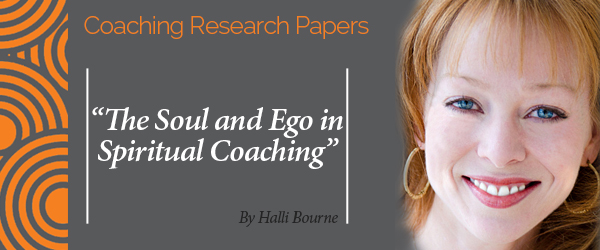A Research Paper created by Halli Bourne
(Spiritual Coaching, UNITED STATES)
The stork of modern American life has delivered a baby of dry, civilized order. Present-day culture has been built on a trim and predictable foundation of convenience, production and appearance, squeezing out the essence of messy human life. A culture devoted to obsessive management wears a colorless mask of homogenization and imprints a lingering disturbance on its citizens. Rationalism and dualism have infected soulful life as systemically as a virus infects the body, and we are inexplicably sad with little direction on what or how to grieve. Carl Jung (1971) says of contemporary life,
An honest admission of modernity means voluntarily declaring oneself bankrupt (p. 458).
Society’s current plague is a cancerous distrust of the soul’s language, a hollowing out of our center where there was once life force and possibility. Can the application of spiritual coaching help restore soulfulness to a life arrested by prosaic reality?
True Self Coaching© is an innovative approach for realizing personal fulfillment in an age where self-sacrifice is endemic and productivity is hailed above all virtues. Through the intelligent inquiry of self-concepts and perceived obstacles, the coaching client uncovers resident truths about who they are and how to take action accordingly from that truth. At the heart of coaching methodology lies investigation; the True Self Coaching© process questions assumptions around unexamined limitations in order to determine strategies for obtaining long-cherished desires. This approach can be defined as spiritual in that feelings and intuition which have no rational or tangible explanation are both validated and encouraged; feelings and intuition can point toward a distinction between the call of the soul and the more familiar, overriding voice of the ego.
What is the soul and how is it relevant to modern life? The American Heritage Dictionary defines the soul as the “animating and vital principle credited with the faculties of thought, action, and emotion… a central or integral part of something” (1976, p. 1234). James Hillman (1989), an archetypal psychologist, states,
By soul I mean… a perspective rather than substance… which makes meaning possible (p. 20).
Soul is ethereal, perhaps even outside of definition, lying
midway between understanding and the unconscious (Moore, 2002, p. xiii).
Soul is the intrinsic impulse behind expressions of art, poetry and dance which define what it means to be human. The soul’s pulse and rhythm are easily muted in the droning of incessant, pointless schedules of busyness, and when this happens the soul calls more insistently. Hillman (1989) assigns the soul as the underlying cause for symptoms of neurosis―a means to “impress the stupid and stubborn mind” (p. 18). Psychotherapist,Thomas Moore (1992), tells us that psychological illnesses such as depression and anxiety can be cured by listening to the
messages that lie within the illness(p. 6).
The soul can be ignored yet its effects will be experienced regardless. Holding firmly to the belief that the soul is merely a notion will not nullify its existence or its influence. In industrialized societies such as the United States, stress disorders plague ‘civilized’ humanity in prolific proportions, as more information is continuously crammed into our overtaxed brains like people into a crowded elevator. The Dalai Lama says of the paradox of our presiding age,
we have more degrees but less sense, more knowledge but less judgment, more experts but more problems…
Has knowledge become the default religion for the prevailing culture, with soulless rites and doctrines empty of wisdom? How can personal satisfaction or life purpose be revealed amidst a flood of schedules and an onslaught of often-irrelevant information disguised as education and mental growth? Has the ‘Information Age’ eclipsed the possibility for self-directed happiness?
